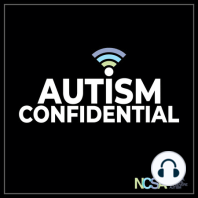12 min listen

Episode 2 - Yes, There Is (Obviously) an Autism Epidemic
Episode 2 - Yes, There Is (Obviously) an Autism Epidemic
ratings:
Length:
80 minutes
Released:
Apr 4, 2022
Format:
Podcast episode
Description
As autism rates have crept upward year after year, it has become common to shrug off the scorching numbers as little more than artifacts of "better awareness" or "diagnostic substitution." But the overwhelming weight of evidence suggests that the increase is real, the result of increasingly common neurodevelopmental disability, and not mere diagnostic shifts. NCSA President Jill Escher discusses this phenomenon with guests Walter Zahorodny, PhD, Associate Professor of Pediatrics, Rutgers University Medical School, and Josephine Shenouda, co-investigator of the Autism and Developmental Disabilities Monitoring Network in New Jersey.
Highlights:
• Using stable, reliable, consistent methodologies, autism rates have been seen to climb from less than 1% to more than 5-7% in metropolitan New Jersey, over about 20 years.
• The increasing rates are not subtle nor confined to certain populations or areas.
• Defying expectations, autism prevalence increases about 11% a year in the U.S., and rates have still not plateaued.
• The findings reflect cases of serious underlying functional disability easily recognized by educators and health providers, and not mere differences or traits of autism.
• There is no evidence that better detection or surveillance is leading to the growing numbers; there is no evidence of an undetected horde of adults that would have qualified as autistic under the criteria.
• Comparing apples:apples, eg, just those with autism and intellectual disability, that population itself has increased dramatically; it's not just mild cases. Autism with ID is about 30-40% of cases. Most cases in the New Jersey studies would satisfy the DSM-IV criteria for "Autistic Disorder."
• About 20% of children with autism in New Jersey are not officially diagnosed by age 8.
• There is no evidence that in-migration to New Jersey has caused the increasing rates.
• Most CDC ADDM sites are underestimating autism prevalence.
• Vaccination is not linked to autism risk, and other environmental factors that have thus far been explored cannot explain the increase in autism, though some factors such as adverse perinatal events (like prematurity) contribute to some degree.
• Diagnostic substitution, such as with intellectual disability, cannot explain the increasing rates.
• Genetic hypotheses attract the bulk of funding but explain little about autism.
• Autism screening using a simple 10-question parent survey they developed is 85% effective at detecting autism at 18-36 months. This can reduce disparities and increase access to intervention.
• Understanding the true prevalence of autism is absolutely foundational to inform policy: programs, staffing, budgets. Yet we are operating on wildly outdated assumptions about autism rates.
Links:
Autism in California 2020: A Report to the Public.
Shenouda J, Barrett E, Davidow AL, Halperin W, Silenzio VM, Zahorodny W. Prevalence of autism spectrum disorder in a large, diverse metropolitan area: Variation by sociodemographic factors. Autism Research. 2022 Jan;15(1):146-55.
Zahorodny W, Shenouda J, Mehta U, Yee E, Garcia P, Rajan M, Goldfarb M. Preliminary evaluation of a brief autism screener for young children. Journal of Developmental and Behavioral Pediatrics. 2018 Apr;39(3):183.
Highlights:
• Using stable, reliable, consistent methodologies, autism rates have been seen to climb from less than 1% to more than 5-7% in metropolitan New Jersey, over about 20 years.
• The increasing rates are not subtle nor confined to certain populations or areas.
• Defying expectations, autism prevalence increases about 11% a year in the U.S., and rates have still not plateaued.
• The findings reflect cases of serious underlying functional disability easily recognized by educators and health providers, and not mere differences or traits of autism.
• There is no evidence that better detection or surveillance is leading to the growing numbers; there is no evidence of an undetected horde of adults that would have qualified as autistic under the criteria.
• Comparing apples:apples, eg, just those with autism and intellectual disability, that population itself has increased dramatically; it's not just mild cases. Autism with ID is about 30-40% of cases. Most cases in the New Jersey studies would satisfy the DSM-IV criteria for "Autistic Disorder."
• About 20% of children with autism in New Jersey are not officially diagnosed by age 8.
• There is no evidence that in-migration to New Jersey has caused the increasing rates.
• Most CDC ADDM sites are underestimating autism prevalence.
• Vaccination is not linked to autism risk, and other environmental factors that have thus far been explored cannot explain the increase in autism, though some factors such as adverse perinatal events (like prematurity) contribute to some degree.
• Diagnostic substitution, such as with intellectual disability, cannot explain the increasing rates.
• Genetic hypotheses attract the bulk of funding but explain little about autism.
• Autism screening using a simple 10-question parent survey they developed is 85% effective at detecting autism at 18-36 months. This can reduce disparities and increase access to intervention.
• Understanding the true prevalence of autism is absolutely foundational to inform policy: programs, staffing, budgets. Yet we are operating on wildly outdated assumptions about autism rates.
Links:
Autism in California 2020: A Report to the Public.
Shenouda J, Barrett E, Davidow AL, Halperin W, Silenzio VM, Zahorodny W. Prevalence of autism spectrum disorder in a large, diverse metropolitan area: Variation by sociodemographic factors. Autism Research. 2022 Jan;15(1):146-55.
Zahorodny W, Shenouda J, Mehta U, Yee E, Garcia P, Rajan M, Goldfarb M. Preliminary evaluation of a brief autism screener for young children. Journal of Developmental and Behavioral Pediatrics. 2018 Apr;39(3):183.
Released:
Apr 4, 2022
Format:
Podcast episode
Titles in the series (56)
Episode 1 - Introducing ... Autism Confidential! by Autism Confidential